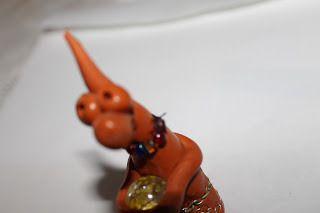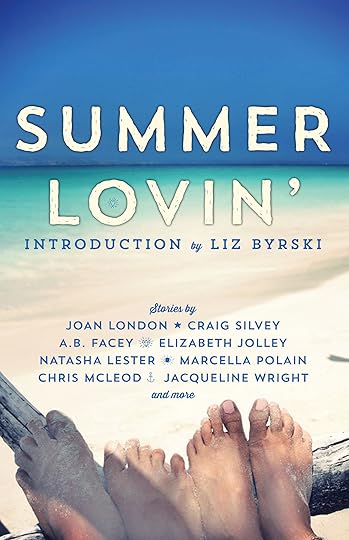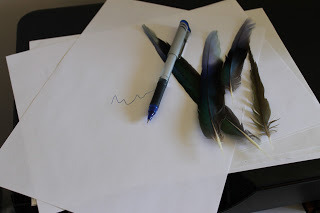Iris Lavell's Blog, page 6
January 1, 2014
Australian men and romantic comedy...
In the spirit of the summer holiday (which it is currently, in the Southern Hemisphere) I have recently read not one, but two , romantic comedies by Australian male writers, and (confess to having) thoroughly enjoyed both. One was The Rosie Project by Graeme Simsion, and the other was The Birdwatcher by William McInnes.
 Beauty is to be found in the most unlikely of places
Beauty is to be found in the most unlikely of placesThe great thing with romance is that it not only forgives, but joyfully celebrates mistakes, awkwardness and misunderstanding based on differences between protagonists. That's where the love comes in.
Where differences involve a man and a woman, it would be easy to slip into unconscious assumptions, hierarchies, or stereotypes regarding male and female thinking and behaviour. Neither of these books does this. What each does, in its own way, is to explore the complexity of relationships between people who are appropriately 'flawed', who are struggling along courageously despite previous setbacks, still seeking happiness in life, and whose characters are all the richer for that.
Human frailty is an important component of the romantic comedy. It provides the comedy part, and the pathos. It provides the feeling that is the heart of the story. In a way, it is the whole point of these stories. Love is stronger and deeper for the incorporation of imperfection, its unconditional acceptance and potential for promoting growth and transformation in the other.
The Rosie ProjectThis book is about an academic seeking a wife for some particularly rational reasons, one being that happily married men tend to be healthier and liver longer than those who remain single (or divorced). He designs a scientifically valid and reliable questionnaire to capture the information that he considers important in sorting the chaff from the grain. So far, so good - the ideal setup placing him in a position where he can only come undone. He is the perfectly flawed antihero, brilliant at his work, and yet unaware of the most basic of unspoken social understanding - the implication is that he is on the high functioning end of the autism spectrum, without having actually been officially designated as such, or accepted such a label for himself. In a lovely scene where he steps in for a colleague and quickly researches and gives a talk to a group of parents and their children about Asperger's he notices that many of the children are occupying their time productively on their tablet devices while the parents are wasting time sitting or talking.
Along comes Rosie who is everything the questionnaire is designed to filter out, whose chaotic life and artistic sensibilities are set to challenge and grow the hero in ways that would have been impossible had he found his 'perfect match'. Despite himself, our hero Don Tillman finds himself deviating from his central purpose of finding a wife so that he can help Rosie to discover the identity of her father.
That Graeme Simpson pulls off the job of the romantic comedy beautifully is evidenced by the popularity of the book. It is well-paced, amusing, touching, and immaculately structured. The structure impressed me in particular because its evenness and self-control seemed so appropriate for the subject matter.
I hadn't thought through structure in this way before. Perhaps finding the structure for a particular work is often an intuitive thing that many writers do, but the right structure for a novel and the nature of the characters portrayed seems to me to be intimately connected. Having recently read Mudwoman by Joyce Carol Oates and The Broken Book by Susan Johnson the contrast between the free-flowing and at times challenging structures of these two brilliant books (both of which explored characters whose relationship with conventional reality and perception was often tenuous) was particularly marked for me.
In The Rosie Project, in the end love wins out, of course. It's not the perfect, uncomplicated love of the happy ever after fairy-tale, but the real, enduring kind that has already been severely tested and well and truly survived.
I'll be giving my take on the William McInnes novel in a separate post, as this one is getting a bit long. In about a week's time. In the meantime, if you want to check it out have a look at this Radio National interview with the author.
Published on January 01, 2014 18:02
Happy New Year!
 We've already started the year with some good news that one of our group's short stories has been accepted for publication by the Margaret River Press. Congratulations Glen Hunting!
We've already started the year with some good news that one of our group's short stories has been accepted for publication by the Margaret River Press. Congratulations Glen Hunting!Glen's story was one of just 24 selected from 260 quality stories submitted to the Margaret River Short Story Competition, and edited by highly respected author Richard Rossiter.
I feel it's going to be a good year for our group members. Watch this space.
Published on January 01, 2014 16:47
December 29, 2013
Writing tip 5 - Live, look, listen, learn. Love. = le livre
What is it about words that begin with the letter 'L"?
Personally I think these impact quite a bit on what is produced. Especially the first one. Important to get out and live life as we go along. Funny thing about writers (big generalisation coming up!) is that we tend to be introverts.

I was born an introvert and grew into one strange combination of someone who is alternately happy to hide away, while at the same time committing myself to activities that force me into the social sphere. I have never regretted the latter. Not wishing to be crude, but let's just say that if I hadn't done that, and if I hadn't kept doing that, I might well have disappeared up any one of my own apertures, a tendency that, even now, I must constantly fight in my own writing.
So my tip is this: don't forget to live. I mean to really engage in living, not to be a fly in the wall, or always in the kitchen at parties (remember the old refrain). On the other hand, sometimes it's good to be a fly on the wall, so this doesn't mean never stepping back. It's just that most of us are already quite good at stepping back.
Look; find new ways of seeing. As writers we need a certain flexibility of mind - a willing suspension of disbelief - just as readers and audiences do. I think this is about taking time to try on the other person's shoes before rushing into judgement. I doesn't mean characters can't be judgemental, but the writer needs to stand back from the character (along with the reader) and know them as separate from self. This also protects the writer from being too distressed when people don't like what they write, or don't like a character.
This is because the writing is not the same as the writer - it is a product of thought, plot decisions, character decisions and play. The process is captured as a product, but by the time the product is produced, the process has moved on. At the same time, the writing can only come from the writer, so the writer needs to constantly grow as a person.
Listen. It takes patience and humility to really hear what another person is saying, especially if that person is very different from oneself. Language is imperfect and we all do our best to express what we mean, but there are so many things that interfere with this. This is such fertile ground for the writer - the stumbling imprecisions of communication. I have recently read Graham Swift's Last Orders (yes, I am a late bloomer in every way - like a Dixie Chick - taking the long way around). If you want a book that brilliantly illustrates the difficulties that people have in reaching out to one another through language read Last Orders.
Learn. Never stop. Everyone has more to learn and much to impart. If writing isn't about learning about the many possibilities of life, then what do we do it for?
Love. Write with love. Keep going until you love what you write. Find a little love and understanding for each of your characters, even (especially?) the villains.
Writing Prompt:
Do something you have never done before; visit a place you have never visited before. Anywhere. Engage, observe, talk to people, listen and learn. Then, as soon as possible, write down your observations either as notes, stream-of-consciousness, or creatively as a poem or scene.
Personally I think these impact quite a bit on what is produced. Especially the first one. Important to get out and live life as we go along. Funny thing about writers (big generalisation coming up!) is that we tend to be introverts.

I was born an introvert and grew into one strange combination of someone who is alternately happy to hide away, while at the same time committing myself to activities that force me into the social sphere. I have never regretted the latter. Not wishing to be crude, but let's just say that if I hadn't done that, and if I hadn't kept doing that, I might well have disappeared up any one of my own apertures, a tendency that, even now, I must constantly fight in my own writing.
So my tip is this: don't forget to live. I mean to really engage in living, not to be a fly in the wall, or always in the kitchen at parties (remember the old refrain). On the other hand, sometimes it's good to be a fly on the wall, so this doesn't mean never stepping back. It's just that most of us are already quite good at stepping back.
Look; find new ways of seeing. As writers we need a certain flexibility of mind - a willing suspension of disbelief - just as readers and audiences do. I think this is about taking time to try on the other person's shoes before rushing into judgement. I doesn't mean characters can't be judgemental, but the writer needs to stand back from the character (along with the reader) and know them as separate from self. This also protects the writer from being too distressed when people don't like what they write, or don't like a character.
This is because the writing is not the same as the writer - it is a product of thought, plot decisions, character decisions and play. The process is captured as a product, but by the time the product is produced, the process has moved on. At the same time, the writing can only come from the writer, so the writer needs to constantly grow as a person.
Listen. It takes patience and humility to really hear what another person is saying, especially if that person is very different from oneself. Language is imperfect and we all do our best to express what we mean, but there are so many things that interfere with this. This is such fertile ground for the writer - the stumbling imprecisions of communication. I have recently read Graham Swift's Last Orders (yes, I am a late bloomer in every way - like a Dixie Chick - taking the long way around). If you want a book that brilliantly illustrates the difficulties that people have in reaching out to one another through language read Last Orders.
Learn. Never stop. Everyone has more to learn and much to impart. If writing isn't about learning about the many possibilities of life, then what do we do it for?
Love. Write with love. Keep going until you love what you write. Find a little love and understanding for each of your characters, even (especially?) the villains.
Writing Prompt:
Do something you have never done before; visit a place you have never visited before. Anywhere. Engage, observe, talk to people, listen and learn. Then, as soon as possible, write down your observations either as notes, stream-of-consciousness, or creatively as a poem or scene.
Published on December 29, 2013 22:21
December 23, 2013
Merry Christmas and love to all...
 Three little words for this Christmas - Mercy, Harmony, TransformationI picked these words at random from a little pack of Inner Beauty cards. It's a nice little pack of cards, each with a single word, coloured to represent or invoke the feeling that goes with the word. There's no explanation as to what the word means, so in that spirit, I will leave it to mean whatever it does to you.
Three little words for this Christmas - Mercy, Harmony, TransformationI picked these words at random from a little pack of Inner Beauty cards. It's a nice little pack of cards, each with a single word, coloured to represent or invoke the feeling that goes with the word. There's no explanation as to what the word means, so in that spirit, I will leave it to mean whatever it does to you.They're good words for this time of the year, I think. Good words for any time of the year.
Thank you for reading the blog this year. I have been posting for just over a year now, and have really enjoyed sharing my thoughts, and sharing in your thoughts for that time. My greatest joy has been to provide an indication of some of the work that others are doing in this local writing network.
I have more writing tips scheduled for the coming period, and I hope to entice more people from the group to provide tasters on their writing projects throughout the year and links to their sites (if they have them). I'll be putting out some of my thoughts on books I read as the year goes along. And probably more things from left field. So if this kind of thing interests you, I hope you continue to pop in when you get the chance.
Merry Christmas! Buon Natale! Melkm Ganna
Joyeux Noël! शुभ क्रिसमस Wesolych Swiat Bozego Narodzenia
Frohe Weihnachten! Рождество
¡Feliz Navidad y próspero Año Nuevo! メリークリスマス
圣诞快乐普通话 Glædelig Jul 聖誕快樂
Published on December 23, 2013 02:33
December 22, 2013
Writing tip 4 - Play. Have fun.
 No, not me, but those are my brothersNow I'm thinking this one should have come before the editing tip, but then again, it should come afterwards, as well. It's one of those things that it's good to remember all through the writing process, because it's play that keeps the spark alive.
No, not me, but those are my brothersNow I'm thinking this one should have come before the editing tip, but then again, it should come afterwards, as well. It's one of those things that it's good to remember all through the writing process, because it's play that keeps the spark alive. Whenever I get stuck, or lose faith in what I am doing, I take some time off and when I come back, I come back to play.
When we were kids we used to use the word 'say' to explore the possibilities of where stories could go.
Kid one: "Say there's this girl called Merry-go-round, and she's always dancing around in circles..."
Kid two: "Yes, and say her brother tries to stop her and say he keeps getting knocked over, and he keeps getting back up and trying to stop her, but say he keeps getting knocked over..."
Kid One: "And say his mum comes in..."
Kid Two: "And say..."
By wandering down the side streets of the imagination - by daydreaming (play dreaming) - the story is progressed. Play can take the project in surprising directions.
So I often give myself a good talking to. And I answer back! My advice to myself is: be foolhardy, be playful. Follow the white rabbit to see where it leads.
Writing prompt
A play conversation without restriction. Really go for it! Take two characters and have a Kid One, Kid Two kind of conversation between them. Play. Have fun. Be as silly as you like.
Published on December 22, 2013 17:47
December 18, 2013
Summer Lovin' over the holidays...
 Yes, this is just a little promo. There are some great stories in here, and also an excerpt from my debut novel. To be read on the beach or by a warm winter fireplace (if you are more towards the top of the world). It is available through Fremantle Press. Oh Molly, do yourself a favour ;-)
Yes, this is just a little promo. There are some great stories in here, and also an excerpt from my debut novel. To be read on the beach or by a warm winter fireplace (if you are more towards the top of the world). It is available through Fremantle Press. Oh Molly, do yourself a favour ;-)
Published on December 18, 2013 16:38
December 16, 2013
Writing tip 3 - avoid imposing interpretation - sometimes
 Editing the skyWell, of course, all tips are made to be untipped - there are exceptions to the rule - but I have often reinvented this one for myself: the more I cut away , the stronger the writing seems to become. This is nothing new. Any course on writing will tell you not to preach, but it's easier said than done.
Editing the skyWell, of course, all tips are made to be untipped - there are exceptions to the rule - but I have often reinvented this one for myself: the more I cut away , the stronger the writing seems to become. This is nothing new. Any course on writing will tell you not to preach, but it's easier said than done.The key is to let the bald story do the work and to relinquish control over manipulating the theories the readers might want to form. I don't want to tell the reader what to make of a character, or a story. I figure that's their job. Risky business, but what can you do?
First draft, of course, is open slather. Write whatever you feel like. I'd go so far as to say it's necessary to overwrite the first draft. Throw everything at it; all the purple prose you can dream up. You never know - you could just come up with the perfect, original metaphor. Plus, it gives you stuff to cut out. What is edited out forms a kind of subtext, a feeling of depth - that something has been left unsaid. I think that it's in these spaces that the story really starts to live.
Once I have an idea of what the story is going to be, I start cutting back, but not before. That stage might take a year, or a couple of months. It doesn't matter. At this point I really try to start sticking to the what , rather than the why . This means dialogue, actions, body language, thoughts - but exercising restraint in developing fully formed, or fully explored thoughts too soon. It takes patience, and self-discipline (two attributes not particularly well-formed within my own personality). Gradually a picture emerges as characters get to know one another, and readers reassess their original perceptions. That's my theory and I'm sticking to it.
Writing Prompt
Take an old story or piece of writing, save the original copy and a new copy and edit the new copy within an inch of its life. By comparing the two side by side you will be able to tell how much cutting the writing can take before it ceases to make sense.
Published on December 16, 2013 01:33
December 14, 2013
Check out this blog
Here's another blog address to put on the list - relevant topics around writing dilemmas: a couple of good ones, one on self-publishing, and another on the e-book.
Published on December 14, 2013 15:53
December 12, 2013
I'm learning French...
Apologies for my accent - or lack of accents! Not sure how to put them up on this English-speaking blog. The spell check doesn't help.

Apparently learning a language other than one's mother tongue is very good for the brain. My tutorial sources - a couple of well-known phrasebooks accompanied by CDs.
Je suis etudiante. Je suis desole je suis en retard. J'ai besoin de trouve une nouveau tete. Je suis seulement australien. J'ecoute le CD dans la voiture, mais je ne comprend pas. Les autres pense que je suis folle. Peut-etre je suis folle. Au secour!
I have so much respect for people who come to an English-speaking country without the language, and who then set about learning enough of it to actually make themselves understood and to understand others. Hats off to you!
One of the things that has occurred to me as I try to get my mouth around the language, is just how difficult it is to engage the equipment needed for speech. It's such a complex skill. The mechanics are difficult, and the tendency is to hear what we expect, and not what is actually there. I actually did do French classes when I was at school, so I thought I would have a basic platform to work from, but it occurs to me that immersion is the only way - hence the constant soundtrack in my car has become the sound of (is it?) an English woman speaking French, and me copying her, trying to get the words right. I spend my drives talking to myself. No Bluetooth.
At least now I know how to say Stop thief! and Can I buy you a drink? What more do you need?

Apparently learning a language other than one's mother tongue is very good for the brain. My tutorial sources - a couple of well-known phrasebooks accompanied by CDs.
Je suis etudiante. Je suis desole je suis en retard. J'ai besoin de trouve une nouveau tete. Je suis seulement australien. J'ecoute le CD dans la voiture, mais je ne comprend pas. Les autres pense que je suis folle. Peut-etre je suis folle. Au secour!
I have so much respect for people who come to an English-speaking country without the language, and who then set about learning enough of it to actually make themselves understood and to understand others. Hats off to you!
One of the things that has occurred to me as I try to get my mouth around the language, is just how difficult it is to engage the equipment needed for speech. It's such a complex skill. The mechanics are difficult, and the tendency is to hear what we expect, and not what is actually there. I actually did do French classes when I was at school, so I thought I would have a basic platform to work from, but it occurs to me that immersion is the only way - hence the constant soundtrack in my car has become the sound of (is it?) an English woman speaking French, and me copying her, trying to get the words right. I spend my drives talking to myself. No Bluetooth.
At least now I know how to say Stop thief! and Can I buy you a drink? What more do you need?
Published on December 12, 2013 23:22
December 9, 2013
Writing Tip 2 - Establish a writing routine
I find it helpful to work on my big writing project every day, even if it is only for half an hour. This keeps it ticking away in the back of my mind and encourages my imagination to take flight. I set myself a daily routine and stick to it, as far as possible.
I recently read an article in the Weekend Australian Review Magazine which reviewed a book by Mason Currey about how many of the great writers have had set routines and habits (some quite unusual) which have helped them in their work. Routines work.
Writing PromptHe thought knew he could fly...
or
write for a few minutes, stream of consciousness, in response to this picture

I recently read an article in the Weekend Australian Review Magazine which reviewed a book by Mason Currey about how many of the great writers have had set routines and habits (some quite unusual) which have helped them in their work. Routines work.
Writing PromptHe thought knew he could fly...
or
write for a few minutes, stream of consciousness, in response to this picture

Published on December 09, 2013 18:33
Iris Lavell's Blog
- Iris Lavell's profile
- 3 followers
Iris Lavell isn't a Goodreads Author
(yet),
but they
do have a blog,
so here are some recent posts imported from
their feed.



